
Korea Observer
Scope & Guideline
Advancing Knowledge on Korea's Cultural Landscape
Introduction
Aims and Scopes
- Political Dynamics and Governance:
The journal explores the intricacies of South Korean politics, including electoral behavior, public policy, governance structures, and the influence of political ideologies on decision-making processes. - International Relations and Security:
A significant focus is placed on South Korea's foreign relations, particularly in the context of regional security issues, alliances, and the geopolitical tensions involving North Korea, China, and the United States. - Socioeconomic Issues and Public Policy:
The Korea Observer addresses various socioeconomic challenges, including public health, welfare policies, economic reforms, and the impact of globalization on South Korean society. - Cultural Studies and Public Diplomacy:
The journal investigates the role of culture in diplomacy, soft power, and societal perceptions, examining how cultural influences shape public attitudes and international relations. - Technological and Environmental Studies:
There is an increasing emphasis on the implications of technology and environmental concerns, particularly in relation to governance, public health responses, and societal adaptation to new challenges.
Trending and Emerging
- Impact of Technology on Society:
There is a notable rise in studies examining the role of technology, particularly digital governance and social media, in shaping public opinion and political discourse, highlighting the intersection of technology and politics. - Public Health and Crisis Management:
The COVID-19 pandemic has prompted a surge in research related to public health responses, crisis management, and the political implications of health crises, indicating a growing recognition of health as a central theme in governance. - Youth Engagement and Political Ideology:
Emerging themes around youth political engagement and the shifting ideological landscape among younger generations in South Korea are becoming increasingly important, reflecting broader global trends of youth activism. - Environmental Politics and Policy:
Research related to environmental concerns and policies, particularly in the context of climate change and sustainability, is gaining prominence, reflecting a global shift towards recognizing environmental issues as critical to security and development. - Regional Security and Geopolitical Competition:
With the intensification of US-China rivalry, there is a growing focus on South Korea's strategic positioning and its foreign policy responses, particularly in relation to North Korea and regional allies.
Declining or Waning
- Historical Analyses of Past Conflicts:
Research focusing on historical events and conflicts, particularly those related to the Korean War or earlier geopolitical tensions, has seen a decline, with the journal shifting towards contemporary issues and future-oriented discussions. - Traditional Security Studies:
While security issues remain a core focus, traditional analyses of military capabilities and strategies are becoming less prevalent as the journal increasingly embraces broader socio-political contexts and non-traditional security threats. - Rural and Agricultural Studies:
Topics related to rural development and agricultural policies in South Korea are appearing less frequently, suggesting a shift towards urban-centric studies and issues reflecting the experiences of urban populations. - Economic Development Models:
The exploration of classical economic development theories in the South Korean context has diminished, as the journal pivots towards more emergent themes such as the digital economy and its socio-political implications. - Bilateral Relations with Japan:
Research specifically focused on Korea-Japan relations, especially historical grievances, has decreased, possibly indicating a shift toward more complex regional dynamics involving multiple actors.
Similar Journals

International Relations of the Asia-Pacific
Challenging Perspectives in Asia-Pacific StudiesInternational Relations of the Asia-Pacific, published by Oxford University Press, is a premier academic journal that delves into the intricate dynamics of international relations in the Asia-Pacific region. Since its inception in 2001, the journal has garnered significant attention within the fields of Political Science, Economics, and Sociology, achieving a respected Q2 quartile ranking in various categories as of 2023. With a Scopus ranking of #172 out of 706 in Political Science and International Relations, it represents the voice of contemporary discourse at the intersection of various social sciences. The journal's objective is to enrich understanding of geopolitical issues, economic trends, and sociopolitical phenomena shaping the Asia-Pacific—a region characterized by its rapid transformation and strategic importance. Despite its non-open access status, readers can expect rigorously vetted articles that challenge conventional paradigms and foster informed debate among academics, policymakers, and students alike. The journal remains an essential resource for anyone looking to navigate the complexities of international affairs in one of the world’s most dynamic regions.
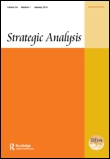
Strategic Analysis
Uncovering strategic frameworks for a safer tomorrow.Strategic Analysis is a prominent academic journal published by Routledge Journals, Taylor & Francis Ltd, focusing on the critical fields of Political Science and International Relations, as well as Safety Research. With an ISSN of 0970-0161 and an E-ISSN of 1754-0054, it stands out as a valuable resource for scholars and professionals interested in strategic studies and related disciplines. The journal's esteemed reputation is highlighted by its placement in Q3 and Q4 categories in the respective fields for 2023, indicating its significant contribution to knowledge and discussion within these domains. Covering a broad timeline with converged years from 1978 to 1984, 1998 to 2004, and now from 2007 to 2024, it provides a platform for innovative research and analytical insights. Readers can benefit from in-depth studies and reviews that address contemporary challenges and strategies in public policy and safety, making it an essential read for researchers, practitioners, and students alike. Although it does not currently offer open access, the journal remains committed to disseminating high-quality research aimed at enhancing strategic frameworks and improving decision-making processes on a global scale.

ASIAN SURVEY
Illuminating the Dynamics of the Asian ExperienceASIAN SURVEY is a premier peer-reviewed journal published by University of California Press, focusing on interdisciplinary research in the realms of Sociology, Political Science, and Geography. Established in 1970, this journal has become an essential resource for scholars and professionals seeking to understand the complexities of Asian societies and their global interactions. With an H-Index that reflects its academic influence, ASIAN SURVEY holds a prestigious position in both the Q2 category of Geography, Planning and Development and in Sociology and Political Science, according to the latest rankings. The journal is well-regarded for its rigorous scholarship, insightful analyses, and wide-ranging coverage of topics pertinent to contemporary Asian studies. Although it is not an open-access journal, it remains accessible through various academic institutions. By fostering dialogue among researchers, practitioners, and policy-makers, ASIAN SURVEY contributes significantly to the advancement of knowledge in understanding the dynamic socio-political landscape of Asia.

Politicka Misao-Croatian Political Science Review
Exploring the Dynamics of Politics with Scholarly Precision.Politicka Misao-Croatian Political Science Review (ISSN: 0032-3241, E-ISSN: 1846-8721), published by SVEUCILISTE & ZAGREBU, FAK POLITICKIH ZNANOSTI, is a leading Open Access journal that has been disseminating influential research in political science and related fields since its inception in 1985. Located in the heart of Croatia, this scholarly platform has gained a robust reputation for publishing high-quality articles that contribute to the understanding of political dynamics, sociology, and international relations. With an impressive Q3 classification in History and Q4 standings in both Political Science and Sociology for 2023, the journal continues to provide valuable insights to researchers, practitioners, and students alike. Recognizing the significance of accessible knowledge, Politicka Misao embraced the Open Access model in 2014, ensuring that critical academic work reaches a broader audience. Its inclusion in prestigious databases further underscores its academic rigor, making it a crucial resource for anyone engaged in political studies and beyond.

POLITICA Y GOBIERNO
Illuminating the Path of Governance and Civic EngagementPOLITICA Y GOBIERNO is a prominent academic journal published by the CENTRO DE INVESTIGACION Y DOCENCIA ECONOMICAS and primarily focuses on the dynamic fields of Political Science and International Relations. Since its inception, the journal has provided a vital platform for scholars and practitioners to disseminate their research, contributing significantly to the discourse surrounding governance and public policy. With a commendable Q2 ranking in the category of Political Science and International Relations, it is recognized for its rigorous academic standards and impactful contributions, particularly in the Latin American context. The journal is committed to exploring critical issues related to politics and government, fostering discussions that shape policy and civic engagement, while being indexed in Scopus with a ranking of 380 out of 706 in its field. Although it does not offer open access, its comprehensive analyses and thought-provoking articles remain essential reading for researchers, professionals, and students seeking to deepen their understanding of governance and political dynamics in Mexico and beyond. The journal can be accessed through institutional subscriptions, ensuring it remains a crucial resource in the study of socio-political processes.
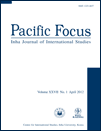
Pacific Focus
Connecting Scholars to the Heart of Pacific PoliticsPacific Focus is a renowned academic journal published by WILEY, focusing on the dynamic fields of Political Science and International Relations. Established in 1986, it has developed a reputation for disseminating innovative research and critical analysis pertinent to the geopolitical landscape of the Pacific region and beyond. With an impressive rank of #370/706 in Political Science and International Relations, notably achieving a Q2 category rating in 2023, it serves as a vital resource for scholars and practitioners alike. The journal also holds a respectable Q3 status in Sociology and Political Science, reflecting its broad interdisciplinary appeal. While currently not offering Open Access, Pacific Focus maintains a commitment to high-quality scholarship through rigorous peer-review processes. Researchers, professionals, and students will find it an essential platform for exploring contemporary issues, fostering academic dialogue, and contributing to the field's evolution.
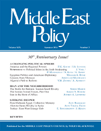
MIDDLE EAST POLICY
Contributing to the Discourse on Middle Eastern ChallengesMIDDLE EAST POLICY stands as a notable journal in the fields of Political Science and International Relations, published by Wiley in the United Kingdom. With a rich publication history dating back to 1992, this journal provides a critical platform for scholarly exploration and dialogue surrounding Middle Eastern political dynamics and policies. It ranks in the Q3 category in the 2023 evaluations for both Political Science and International Relations and Sociology, indicating its influential role in these academic fields. While it does not offer open access, it is recognized for its rigorous peer-reviewed articles that contribute valuable insights and analyses on pressing regional challenges and institutional frameworks. Researchers, professionals, and students engaged in Middle Eastern studies will find MIDDLE EAST POLICY essential for understanding the complex socio-political landscapes of the region and for fostering informed discussions that advance both scholarship and practice.
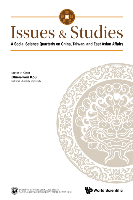
ISSUES & STUDIES
Bridging Theory and Practice in Global AffairsISSUES & STUDIES is a prestigious academic journal published by World Scientific Publishing Company, specializing in the fields of Political Science and International Relations, as well as Sociology. With a distinguished publication history since its inception in 1972, the journal has consistently aimed to disseminate high-quality research and insightful analyses that inform and inspire discussions in relevant scholarly communities. Currently housed in Taiwan, it enjoys a notable impact, categorized in the Q2 quartile across its disciplines, reflecting its significant contribution to ongoing academic discourse. The journal is indexed by Scopus and holds respectable rankings in both Political Science and Sociology, underlining its role as a vital resource for researchers, professionals, and students alike. Engaging with ISSUES & STUDIES offers a unique opportunity to explore contemporary and historical issues through a scholarly lens, promoting a deeper understanding of complex socio-political dynamics.
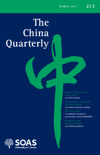
CHINA QUARTERLY
Unveiling the Interconnections of Geography, Politics, and Development in ChinaCHINA QUARTERLY, an esteemed journal published by Cambridge University Press, serves as a leading platform for scholarly discourse in the fields of Development, Geography, Planning and Development, and Political Science and International Relations. With a strong reputation evidenced by its Q1 ranking in multiple categories and indexed since 1960, it attracts a diverse array of research focusing on the socio-economic and political dynamics within China and its impact on global affairs. The journal's rigorous peer-review process ensures the publication of high-quality articles that contribute meaningfully to contemporary debates and theoretical advancements. Although not open access, CHINA QUARTERLY offers extensive research opportunities for scholars, professionals, and students keen on exploring and understanding the intricate layers of China’s development and its global relations. Its dedicated address in Cambridge, United Kingdom underscores its commitment to fostering international dialogue and academic collaboration.
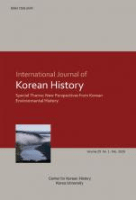
International Journal of Korean History
Advancing Global Scholarship on Korean HeritageInternational Journal of Korean History, published by Korea University, Center for Korean History, is a leading academic journal dedicated to the exploration and dissemination of research on Korean history, culture, and literature. Since its establishment in 2000, the journal has embraced an Open Access model, ensuring that groundbreaking scholarship is freely accessible to researchers, professionals, and students worldwide. With an ISSN of 1598-2041 and an E-ISSN of 2508-5921, the journal has shown impressive rankings, currently holding a Q3 category in both Cultural Studies and History, and a Q2 category in Literature and Literary Theory as of 2023. Its Scopus rankings further highlight its academic significance, sitting in the 81st percentile for Literature and Literary Theory and maintaining a strong presence in related fields. Operating from Seoul, South Korea, the International Journal of Korean History serves as a vital platform for scholarly dialogue and research dissemination, contributing significantly to the global understanding of the intricate narratives that shape Korean history.